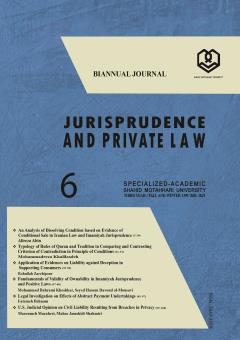-
-
-
Open Access Article
1 - Legal Status of Contracts Contradicting Conditional Agreements
Mohammad Mohammad Baramai Abbas AsgariAbstract: Although in conditional contracts the effects of contract appear after realization of the conditionality of the contract, that does not mean the conditional contract lacks its effects before realization of the conditionality. Therefore, in alienative contracts MoreAbstract: Although in conditional contracts the effects of contract appear after realization of the conditionality of the contract, that does not mean the conditional contract lacks its effects before realization of the conditionality. Therefore, in alienative contracts, the effect of conditional contract before meeting its conditions shall be attributed to the buyer as a sort of conditional ownership. Perhaps it is because of such right for the promisee in the conditional contract (before meeting the conditions) that any contract contradicting with it may be pronounced non-effective or void. However, a review of the statements of evidence of each one of the three reasons for nullity, ineffectuality and authenticity of such contracts it can be claimed that any contract contradicting conditional contract is sound and valid. This, however, does not mean ignoring the promisee’s rights in conditional contract; rather, by virtue of the conditional contract, the object of transaction along with the buyer’s legitimate right in conditional contract will be transferred to the promisee as is. Of course, for final decision on the conditional contract, the parties should wait for the final status of the conditionality in the contract. In case of failure to meet the conditions, the real right of the buyer in conditional contract over the object of transaction will be null and void and when the conditions are met, one should see when the effects of the conditional contract will be valid. In the meantime, there should be a distinction between formation and validity of the contract vis-à-vis the promisee of the conditional contract. Manuscript profile -
Open Access Article
2 - Fundamentals of Validity of Ownability in Imamiyah Jurisprudence and Positive Laws
Mohammad Mohammad Baramai سيدحسن داودالموسویUnderstanding the fundamentals of ownability of a property is important in distinguishing property from non-property. Since jurists of Imamiyah jurisprudence have no consensus on definition of ownability of a property and the Civil Law has not specified what the proper MoreUnderstanding the fundamentals of ownability of a property is important in distinguishing property from non-property. Since jurists of Imamiyah jurisprudence have no consensus on definition of ownability of a property and the Civil Law has not specified what the property is by definition, the importance of understanding the fundamentals of ownability of a property has further come to light. This paper intends to find a unified criterion for validity of ownability of a property, analyze the criteria set by the jurists, and investigate the strengths and weak points of the expressed criteria. The criterion thus achieved helps distinguishing property from non-property in doubtful cases. Such power of distinction helps us in various issues since ownability is a matter of credibility and the right understanding of ownability and its attachments depends upon acquiring knowledge on credit concepts and its specifications. Therefore, this paper points to some instances of credits. The author of this paper is of the opinion that the major criterion for understanding ownability is the rational approach toward this subject and other criteria expressed are either problematic or abundant. The paper has finally discussed available solutions in case doubts appear in conventional and legal ownability of a property. Manuscript profile
List of Articles Khoshkar Mohammad Baramai
-
The rights to this website are owned by the Raimag Press Management System.
Copyright © 2017-2024


